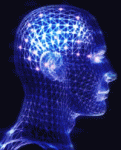Oct 26, 2005
Theta brainwave triggered training boosts old brains
It has long been known that hippocampus is involved in the learning process. A study published on the Proceedings of the National Academy of Science (USA) has shown that theta brainwave triggered training can enhance learning rate in old rabbits, contrasting the deficit determined by the aging process. This study could have important implications in the development of nonpharmacological treatments for age-related memory deficits.

Nonpharmacological amelioration of age-related learning deficits: The impact of hippocampal  -triggered training
-triggered training
 rhythm, is known to enhance hippocampal plasticity and accelerate learning rate in young subjects, suggesting that manipulations of
rhythm, is known to enhance hippocampal plasticity and accelerate learning rate in young subjects, suggesting that manipulations of  activity might be used as a means to counteract impairments related to the aging process. Here, young and older rabbits were given eyeblink conditioning trials either when exhibiting hippocampal
activity might be used as a means to counteract impairments related to the aging process. Here, young and older rabbits were given eyeblink conditioning trials either when exhibiting hippocampal  (
( +) or regardless of hippocampal activity (yoked control). Although, as expected, older-yoked control animals showed a learning deficit, the older
+) or regardless of hippocampal activity (yoked control). Although, as expected, older-yoked control animals showed a learning deficit, the older  + group learned as fast as young controls, demonstrating that aging deficits, at least in eyeblink classical conditioning, can be overcome by giving trials during episodes of hippocampal
+ group learned as fast as young controls, demonstrating that aging deficits, at least in eyeblink classical conditioning, can be overcome by giving trials during episodes of hippocampal  activity. The use of several learning criteria showed that the benefits of hippocampal
activity. The use of several learning criteria showed that the benefits of hippocampal 
 -triggered training in both age groups during the early phase of acquisition, the enhancement persisted in older animals, peaking during later performance. These findings have implications for theories of age-related memory deficits and may contribute to the development of beneficial treatments. depend on different cognitive or motor processes. Whereas there was a benefit of
-triggered training in both age groups during the early phase of acquisition, the enhancement persisted in older animals, peaking during later performance. These findings have implications for theories of age-related memory deficits and may contribute to the development of beneficial treatments. depend on different cognitive or motor processes. Whereas there was a benefit of16:35 Posted in Mental practice & mental simulation | Permalink | Comments (0) | Tags: Positive Technology, mental practice, motor imagery







The comments are closed.